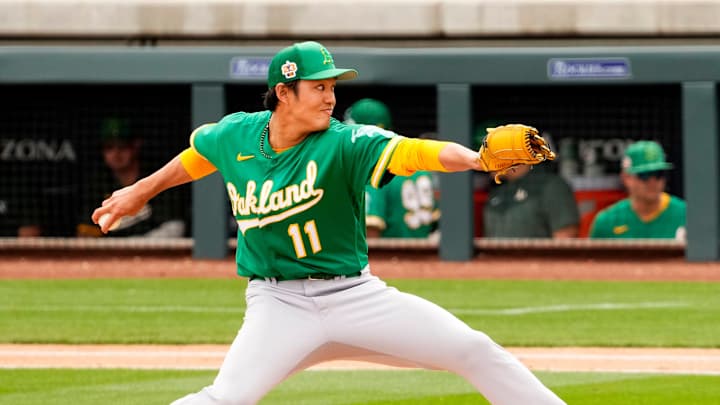Shintaro Fujinami: 2023 A's Player Outlook

The road for Shintaro Fujinami hasn't always been a clear path to success. He was selected first overall back in 2012 by the Hanshin Tigers in NPB, and Shohei Ohtani was in that class as well. The potential has always been there, but unlocking that potential hasn't always been easy.
After he was drafted, Fuji went straight to the big leagues as a 19 year old in Japan, finishing with a 2.75 ERA across 137.2 innings. He was nearly ten years younger than the average player in that league. He pitched well through 2016, but in 2017 he started having some issues with his command, and started splitting time between the big leagues and the minors.
Last season, at age 28, the righty seemed to get his command under control, and that led him to signing a one-year deal with the Oakland A's this off-season.
In the glimpses of Fuji that we have seen, he's been exactly as advertised: Utterly dominant stuff when he's locating, with bouts of wildness.
His first spring game was a brief explainer into the Shintaro Fujiami Experience. He went two innings total in that start against Shohei Ohtani, and in the first inning, he led off the game with a strikeout of the pesky David Fletcher. Luis Rengifo singled off Fuji--literally--but the 6-foot-6 right-hander struck out Jake Lamb, then got Mickey Moniak to pop out to second.
Not a bad first inning.
In the second, he walked the first three batters he faced, loading the bases. After a quick visit with pitching coach Scott Emerson, he refocused and recorded a strikeout and a double play to get out of the inning without allowing any damage.
In his second start he allowed his first run of the spring, starting the second inning off with a walk to Arizona's Buddy Kennedy, before a ground out pushed the runner to second, a wild pitch sent Kennedy to third, and a single drove him home. Fujinami wasn't giving up hard contact. He beat himself in that inning.
Monday's start against the Colorado Rockies gave A's fans another reason to be excited about Fuji this season. The game didn't start the way you'd draw it up, with Fuji needing 35 pitches to get through the first inning while allowing three runs to cross the plate, but he went to the dugout, made his adjustments, and in the second inning he had a three up, three down frame. In the third, he allowed a Mike Moustakas single and tossed a wild pitch, but those were the only blemishes.
He finished Monday's game after allowing one final walk to begin the fourth. His final line: 3 IP, 4 hits, 4 ER, 3 BB, 7 K. He threw 70 pitches and hit 99 with his four-seamer, and a ridiculous 93.8 mph with his splitter. His average velocity on that split was 91.4, which would rank as the fourth-hardest among last year's splitters.
There's a lot for A's fans to be excited about when it comes to Fujinami. Not only is he delightful, but he can also run it up to triple digits and make batters look foolish in the box.
While he's been touched up here and there, he's also shown that he can make adjustments and get back to his dominant stuff when he's just a little off, and that is encouraging. Fuji has needed to make an adjustment in each start, and he has been able to make that adjustment, and return to dominance.
Those adjustments are going to be the key for Fujinami to have success in 2023. Obviously it would just be better if he had pinpoint command at all times, but if he did, he would have come to MLB a lot sooner, and he likely wouldn't have signed with the A's. But Oakland has a history of getting the most out of these types of pitchers. Part of that can be credited to the Oakland Coliseum, one of the best pitcher's parks in baseball. The other part of that equation is the coaching staff.
Fuji has the tools to be a successful pitcher at the big-league level. FanGraphs has him projected for a roughly league average ERA (3.71 on ZIPS, 4.43 on Steamer) while striking out right about one an inning and walking more than we're all comfortable with (4-5 per nine). If he can be a league average pitcher in his first year in the Majors, then that would arguably be a success.
There will be games when he fires seven shutout innings, and there will be others where he goes three and his pitch count gets out of hand. That's just the kind of pitcher that he seems to be at the moment, but there is room for growth in his rookie campaign, too.
He has tremendous upside, and he's going to be must-watch tv every sixth day.

Jason has been covering the A’s at various sites for over a decade, and was the original host of the Locked on A’s podcast. He also covers the Stanford Cardinal as they attempt to rebuild numerous programs to prominence.
Follow byjasonb